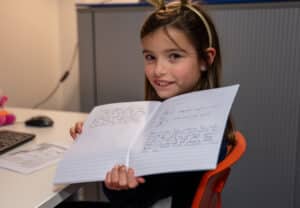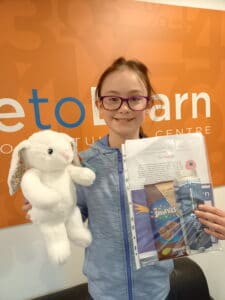Dyslexia Guide
What is Dyslexia?

We often hear children and adults described as ‘dyslexic’, but what do we mean and are we right? There are many different views on what dyslexia actually is and definitions vary across cultures and professions. In fact there is no right or wrong answer, as there is no one accepted definition for dyslexia.
In broad terms dyslexia is mainly a language based learning disability. Those affected have problems acquiring and retaining literacy skills such as reading writing and spelling. It is now widely accepted that dyslexia can also affect a number of other areas including memory, organisation, concentration and even balance. This is why processing information can be so difficult for dyslexics.
However, many famous people who have had varying degrees of dyslexia, such as Albert Einstien, Winston Churchill and Richard Branson, were not prevented from becoming highly

successful in their chosen fields. Dyslexia does not have to prevent people from achieving. But, because it affects the way people process information it can, as a result, affect their ability to learn. This processing difficulty can be due to a number of reasons:
![]()
| • A marked inefficiency in the working or short-term memory system
• Problems connecting the letter patterns with the associated sounds (phonics) • Difficulties ordering or sequencing; this may also show itself as clumsiness caused by the brain sending the wrong signals to parts of the body in the wrong order • A range of problems connected with visual processing and accessing the memory of visual patterns
|
At I Love To Learn Professional Tuition Centres children (aged between 6 and 16) are offered free assessments, in reading, writing, spelling and phonic awareness. Parents are given an opportunity to discuss their children’s individual needs and receive advice. They also offer tuition to help children overcome the specific difficulties that they are having. Educational plans are tailor made using the information gained at the assessment.
At I Love To Learn ‘We are aware that dyslexia is an umbrella term and therefore like to assess each child in order to determine their particular needs. For those who wish to receive support at one of our centres we design individual lesson plans and target areas for development. We also praise children’s strengths and boost their confidence as children can feel very negative about their difficulties in this area.
If a child comes to us for tuition we see them either once or twice a week for 80 minute sessions. During this time they will use both written and computer based resources and complete up to six activities. Success is built in and the progress they make is built upon weekly. This is supported by weekly homework as well. It sounds a lot but the children love seeing their skills grow. It is so rewarding to see children become more confident readers and writers.’ Knowing your child is at risk of Dyslexia and then knowing what to do about it are two different things. We want to be active in being part of the solution.


 “We had planned to stop the tutoring after the 11+ exam, but with the next lockdown and more disruption to her education, we quickly relented when she literally begged us to continue going! The sessions are adjusted to her needs and she describes them as ‘really fun’ and she likes it that the work is specific to her level and much more individualised than the class work at school.”
“We had planned to stop the tutoring after the 11+ exam, but with the next lockdown and more disruption to her education, we quickly relented when she literally begged us to continue going! The sessions are adjusted to her needs and she describes them as ‘really fun’ and she likes it that the work is specific to her level and much more individualised than the class work at school.”

